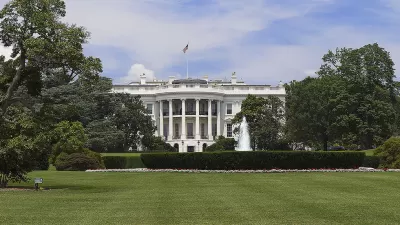The proposed budget seeks to expand the housing voucher program, incentivize housing production, and promote zoning reform, but will likely face strong opposition from congressional Republicans.

The proposed budget released by the White House on Thursday includes over $175 billion in investments directed at increasing the nation’s housing supply and alleviating the affordability crisis.
As Michael Brady explains in Smart Cities Dive, “The budget proposal includes $59 billion in mandatory funding and tax incentives to increase the affordable housing supply and $10 billion in mandatory funding to create incentives for state and local governments to eliminate barriers to affordable housing such as restrictive zoning.”
The proposal includes a neighborhood homes tax credit, which “would cover the gap between the construction costs and the sale price for rehabilitated or newly constructed single-family homes in low-income communities,” as well as an expansion of the low-income housing tax credit, rental assistance, among other incentives and subsidies. The budget also proposes an expansion of the Housing Choice Voucher program, voucher guarantees for vulnerable groups, and funding for eviction prevention efforts.
Brady notes that “Congress is unlikely to pass the president’s budget as written, with the White House engaged in a pitched battle with congressional Republicans over spending priorities and the debt ceiling.” Meanwhile, a budget outline being considered by congressional Republicans would cut 43 percent from housing programs and paves the way for eliminating the Housing Choice Voucher program.
FULL STORY: More than $175B in housing investments in Biden budget proposal

Planetizen Federal Action Tracker
A weekly monitor of how Trump’s orders and actions are impacting planners and planning in America.

Restaurant Patios Were a Pandemic Win — Why Were They so Hard to Keep?
Social distancing requirements and changes in travel patterns prompted cities to pilot new uses for street and sidewalk space. Then it got complicated.

Map: Where Senate Republicans Want to Sell Your Public Lands
For public land advocates, the Senate Republicans’ proposal to sell millions of acres of public land in the West is “the biggest fight of their careers.”

Maui's Vacation Rental Debate Turns Ugly
Verbal attacks, misinformation campaigns and fistfights plague a high-stakes debate to convert thousands of vacation rentals into long-term housing.

San Francisco Suspends Traffic Calming Amidst Record Deaths
Citing “a challenging fiscal landscape,” the city will cease the program on the heels of 42 traffic deaths, including 24 pedestrians.

California Homeless Arrests, Citations Spike After Ruling
An investigation reveals that anti-homeless actions increased up to 500% after Grants Pass v. Johnson — even in cities claiming no policy change.
Urban Design for Planners 1: Software Tools
This six-course series explores essential urban design concepts using open source software and equips planners with the tools they need to participate fully in the urban design process.
Planning for Universal Design
Learn the tools for implementing Universal Design in planning regulations.
Heyer Gruel & Associates PA
JM Goldson LLC
Custer County Colorado
City of Camden Redevelopment Agency
City of Astoria
Transportation Research & Education Center (TREC) at Portland State University
Camden Redevelopment Agency
City of Claremont
Municipality of Princeton (NJ)





























